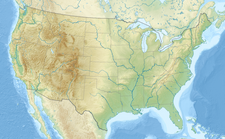Palisade Glacier
| Palisade Glacier | |
|---|---|
 Climbing the Palisade Glacier | |
| Type | Mountain glacier |
| Location | Palisades, Inyo County, California, U.S. |
| Coordinates | 37°06′00″N 118°30′37″W / 37.10000°N 118.51028°W[1] |
| Area | .31 sq mi (0.80 km2) |
| Length | .81 mi (1.30 km) |
The Palisade Glacier is located on the northeast side of the Palisades within the John Muir Wilderness in the central Sierra Nevada of California.[2] The glacier descends from the flanks of four mountain peaks over 14,000 ft (4,300 m) in elevation of which North Palisade (14,242 ft (4,341 m)) is third highest peak in the Sierra Nevada Range.[3]
The cirque containing the Palisade Glacier has a history of thousands of years of glaciation. The modern glacier attained its last maximum extent during the Little Ice Age, between 250 and 170 years ago (a period also known as the Matthes glaciation in the Sierra Nevada).[4][5] It currently has an area of .31 sq mi (0.80 km2) and the glacier is .81 mi (1.30 km) long and .50 mi (0.80 km) wide.[6] It is located between 13,400 and 12,000 ft (4,100 and 3,700 m) and moves at a rate of 20 ft (6.1 m) per year, although it is also retreating.[7] Palisade Glacier is one of the few glaciers in California that terminates in a proglacial lake dammed by its former moraine and the lake is turquoise colored from the glacial powder suspended in the water. The Big Pine Lakes below the glacier are also the same color.[8] Another feature of the glacier is a moulin,[7] which was formed in a drought during 1977,[9] and a bergschrund.[4]

See also in the United States
References
- ^ "Palisade Glacier". Geographic Names Information System. United States Geological Survey, United States Department of the Interior. Retrieved 2012-10-02.
- ^ North Palisade, CA (Map). TopoQwest (United States Geological Survey Maps). Retrieved 2012-10-02.
- ^ "North Palisade, California". Peakbagger.com. Retrieved 2012-10-02.
- ^ a b Mary Hill (2006). Geology of the Sierra Nevada. University of California Press. ISBN 978-0-520-23695-0.
- ^ Bowerman, Nicole D.; Doulgas H. Clark (May 2011). "Holocene Glaciation in the Central Sierra Nevada, California". Quaternary Science Reviews. 30 (9–10): 1067. doi:10.1016/j.quascirev.2010.10.014.
- ^ James Gregory Moore (2000). Exploring the Highest Sierra. Stanford University Press. ISBN 978-0-8047-3703-6.
- ^ a b Isaac Nadeau (2006). Glaciers. The Rosen Publishing Group. ISBN 978-1-4042-3124-5.
- ^ Allan A. Schoenherr (1995). A Natural History of California. University of Oregon Press. ISBN 978-0-520-06922-0.
- ^ Bill Guyton (2001). Glaciers of California: Modern Glaciers, Ice Age Glaciers, the Origin of the Death Valley, and a Glacier Tour in the Sierra Nevada. University of California Press. ISBN 978-0-520-22683-8.


